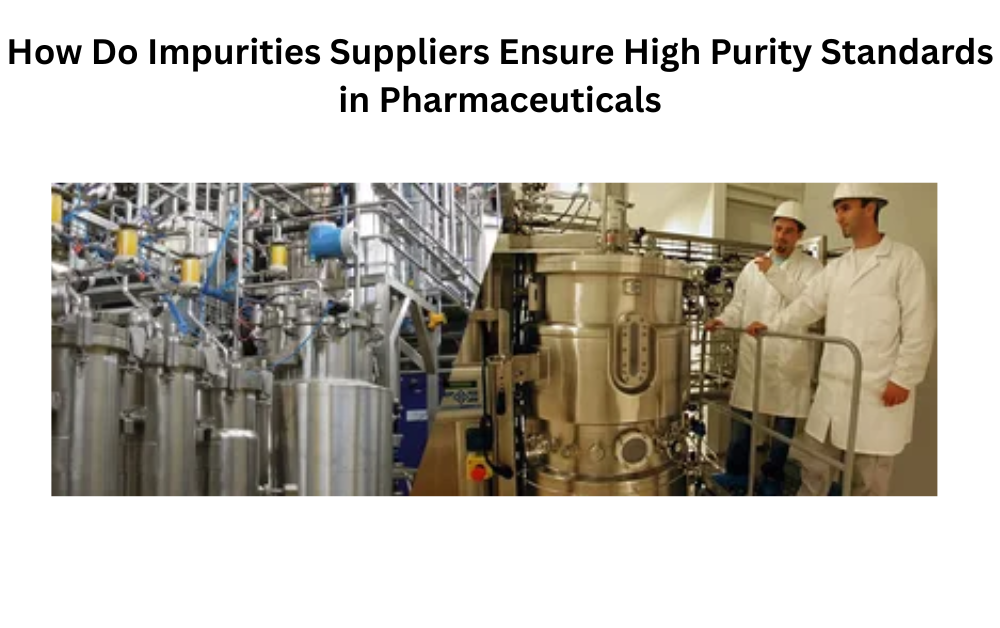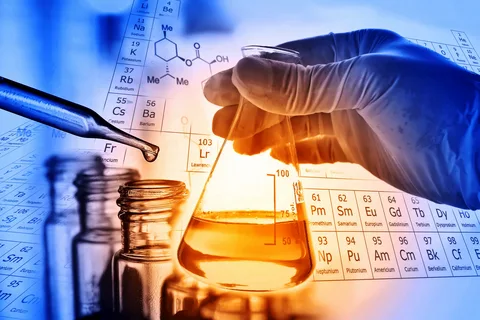How Do Impurities Suppliers Ensure High Purity Standards in Pharmaceuticals

Pharmaceutical companies rely heavily on the quality of their raw materials, intermediates, metabolites, and impurities to develop safe and effective drugs. Even minor impurities in a drug substance can affect its safety, efficacy, and regulatory approval. That’s why working with trusted impurities suppliers is critical. These suppliers are responsible for ensuring that their chemical materials meet the highest purity standards required in the pharmaceutical industry.
In this blog, we will explore how impurities suppliers maintain high-quality standards, the processes they follow, and the ways they ensure safety, consistency, and compliance.
Understanding Impurities in Pharmaceuticals

Before we dive into how suppliers ensure high purity, it is important to understand what impurities are and why they matter.
Impurities are unwanted chemical substances that may be present in raw materials, intermediates, or final drug products. They can originate from:
-
Raw materials used in synthesis
-
Byproducts formed during chemical reactions
-
Contamination during handling or storage
Impurities can impact the quality and safety of drugs, making it essential to control them carefully. Suppliers of impurities, intermediates, and metabolites play a key role in this process by providing highly pure, well-characterized materials.
Why High Purity Is Critical in Pharmaceuticals
High purity in pharmaceutical materials is not just a technical requirement; it is a matter of patient safety and regulatory compliance.
-
Patient Safety: Even trace amounts of harmful impurities can cause adverse reactions.
-
Drug Efficacy: Impurities can affect the performance of active pharmaceutical ingredients (APIs).
-
Regulatory Compliance: Regulatory authorities such as the FDA and EMA require strict control of impurities in drug substances.
-
Consistency: High purity ensures that every batch of a drug product performs consistently.
By ensuring high purity, suppliers help pharmaceutical companies meet both safety standards and regulatory expectations.
Key Steps Impurities Suppliers Take to Ensure High Purity
Reliable impurities suppliers follow a series of steps to guarantee high purity standards. These steps involve careful planning, quality control, and continuous monitoring.
Step 1: Source Selection and Raw Material Verification
The first step in maintaining high purity is sourcing the right raw materials.
-
Supplier Verification: Impurities suppliers often carefully select their raw material providers. They check for quality certifications and previous performance records.
-
Material Testing: Every incoming batch of raw materials is tested for contaminants before it is used in synthesis.
-
Documentation: Proper documentation ensures traceability of raw materials in case any issues arise.
By starting with high-quality materials, suppliers reduce the risk of introducing unwanted substances into the final product.
Step 2: Controlled Synthesis Processes
Impurities, intermediates, and metabolites are often produced through complex chemical reactions. The synthesis process must be controlled to minimize the formation of unwanted byproducts.
-
Optimized Reaction Conditions: Suppliers carefully control temperature, pressure, reaction time, and solvents to reduce impurity formation.
-
Process Monitoring: Advanced instruments continuously monitor reactions to detect deviations that could affect purity.
-
Standard Operating Procedures (SOPs): Following SOPs ensures consistent results across batches.
Controlled synthesis is a critical step in achieving the desired purity level of chemical intermediates or impurities.
Step 3: Purification and Separation
After synthesis, the desired compounds are purified to remove any remaining contaminants or byproducts.
-
Recrystallization: A common method where pure crystals of the compound are separated from the solution.
-
Chromatography: Used to separate compounds based on differences in their physical or chemical properties.
-
Filtration and Washing: Helps remove insoluble impurities from the product.
These purification steps are repeated as necessary to achieve the required purity standards.
Step 4: Analytical Testing and Quality Control
Once the compound is purified, rigorous testing is conducted to verify its purity. Analytical testing is one of the most critical steps in ensuring quality.
-
Spectroscopy: Techniques like NMR, IR, and UV spectroscopy are used to analyze molecular structure and detect impurities.
-
Chromatography: HPLC (High-Performance Liquid Chromatography) and GC (Gas Chromatography) help quantify impurities.
-
Mass Spectrometry: Determines molecular weight and confirms the identity of the compound.
-
Elemental Analysis: Ensures that the chemical composition matches the required specifications.
Quality control laboratories in suppliers’ facilities ensure that every batch meets strict purity standards before release.
Step 5: Batch Documentation and Traceability
Reliable suppliers maintain detailed records for every batch they produce. This documentation includes:
-
Raw materials used
-
Process parameters
-
Analytical test results
-
Purification steps
Traceability is critical for regulatory compliance and for addressing any future issues. If a problem arises, suppliers can track the batch back to its origin and identify the cause.
Step 6: Compliance with International Standards
Pharmaceutical impurities suppliers must comply with regulatory requirements from agencies like the FDA, EMA, and ICH.
-
Good Manufacturing Practices (GMP): Ensures production is consistent, controlled, and of high quality.
-
ICH Guidelines: Provide limits for impurities in active pharmaceutical ingredients.
-
Environmental and Safety Compliance: Handling and disposal of chemicals are done according to regulations to protect workers and the environment.
Compliance demonstrates reliability and builds trust with pharmaceutical companies.
Choosing the Right Impurities Supplier
Not all suppliers can maintain these high standards. Here are key factors to consider when selecting a reliable impurities supplier:
-
Certifications: Check for GMP, ISO, or other relevant certifications.
-
Experience: Suppliers with years of experience in pharmaceutical chemicals tend to deliver better quality.
-
Technical Support: Suppliers who provide scientific guidance and troubleshooting support add extra value.
-
Customer References: Feedback from other clients helps verify reliability.
-
Supply Chain Stability: Ensure that the supplier can provide continuous supply without disruptions.
Choosing the right supplier ensures both quality and peace of mind.
The Role of Technology in Ensuring High Purity
Modern chemical suppliers use advanced technology to maintain purity standards.
-
Automated Monitoring: Digital sensors track reaction parameters to prevent deviations.
-
Data Analytics: Helps detect patterns and predict potential impurities.
-
High-Precision Instruments: Instruments like HPLC and mass spectrometry allow detection of even trace impurities.
Technology ensures consistency, accuracy, and faster detection of potential quality issues.
Benefits of Working with Reliable Impurities Suppliers
Partnering with a trusted impurities supplier offers multiple advantages:
-
Consistent Quality: Every batch meets strict purity standards.
-
Regulatory Compliance: Reduces the risk of regulatory issues and delays in drug approval.
-
Cost Savings: Fewer rejected batches mean reduced waste and cost savings.
-
Faster Product Development: Reliable materials speed up research and development processes.
-
Safety: Proper handling and storage reduce risks to workers and the environment.
A strong supplier partnership is essential for sustainable growth in the pharmaceutical industry.
Final Thoughts
High purity standards are essential in pharmaceuticals because they directly impact patient safety, product efficacy, and regulatory approval. Impurities suppliers play a vital role by ensuring that every batch of intermediates, metabolites, or impurities meets these standards.
By sourcing high-quality raw materials, controlling synthesis processes, purifying compounds, conducting rigorous testing, maintaining detailed documentation, and complying with international standards, reliable suppliers help pharmaceutical companies deliver safe and effective products.
When choosing a supplier, always check for certifications, experience, technical support, and references. Modern technology and advanced analytical tools further enhance the ability of suppliers to maintain purity.
Working with a trusted impurities supplier is not just a business decision; it is an investment in quality, safety, and long-term success in the pharmaceutical industry.
PureSynth Research Chemicals are a global solution provider and thrive to push the frontiers of chemistry. Don’t be limited by synthetic accessibility. Turn your imagination into reality and make the molecule you should, not the one you could. Our chemical expertise gives you access to a virtually infinite chemical space, helping you grasp the full potential of your ideas.
For more insightful articles related to this topic, feel free to visit: mifinder.co
- Art
- Causes
- Crafts
- Dance
- Drinks
- Film
- Fitness
- Food
- Games
- Gardening
- Health
- Home
- Literature
- Music
- Networking
- Other
- Party
- Religion
- Shopping
- Sports
- Theater
- Wellness


